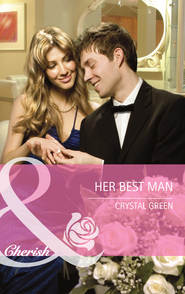По всем вопросам обращайтесь на: info@litportal.ru
(©) 2003-2024.
✖
Courted by the Texas Millionaire
Автор
Год написания книги
2019
Настройки чтения
Размер шрифта
Высота строк
Поля
She had seemed to be deciding whether to hug him or not, but his own posture—stiff-shouldered, his body just now catching up with his bruised pride—must’ve warned her off, because she didn’t make a move toward him.
“Davis,” she said in a low tone that had always belied a prim, innocent facade. He’d always thought that Violet sounded like a Hollywood actress who hadn’t found the limelight yet.
But from what he knew about the career she’d built on the city desk of the L.A. Times, she’d become a rising star in the world of journalism.
She stuffed her hands in her pockets, acknowledging the tension between them. “I was just walking around Old Town, taking everything in.”
She glanced around the now-empty room. The silence of it echoed.
As if wanting to fill it up, she asked, “What’s the occasion?”
Dancing around the past like this shouldn’t bother him as much as it did. Years had gone by. He could be civil, even though he felt the anger, the shame of her leaving him creeping back up on him. “It’s a fundraiser for a local charity. We had the reception in the Recorder’s office because the paper’s been featuring different families who need some extra help these days.”
She’d grown up with a lot of the hard-luck families who benefited from Helping Hand, some of them mining people who’d been struggling ever since the kaolin operation had shut down. That mine had once been the foundation of St. Valentine, producing china clay that could be used to make paper, plastic, paints and the like.
He put his champagne down on a desk. Friendly. He had to be friendly, because time had passed and he’d matured. None of it mattered now.
“So you’re paying the town a visit,” he said.
“I guess you could call it that.” Her skin flushed as she glanced away. “It won’t be for very long, though. I can’t even stay here right now—I’m starting a shift at the Queen of Hearts.”
“Helping your parents for the weekend?” God, this small talk was killing him.
Violet wandered a few steps away, robbing him of the high he felt just standing close to her. “You’re going to hear this sooner or later,” she said, “so I’ll just tell you. I’m here temporarily because I lost my job at the Times. Layoffs. The economy. You know.”
“I’m sorry to hear that.”
He’d spent a lot of time that long-ago summer thinking bitter thoughts about her, as well as about his mother, who’d been the driving force in making Violet leave. Mom had found out that the rich kid and the miner’s daughter were having a secret relationship.
Sure, he’d been the one who’d suggested keeping the meetings under the radar, “just for the summer,” until college started and they could leave for L.A. together to start a new life. But, really, he had wanted secrecy because he’d been just as bad as his mom when it came to being fully aware that Violet was a miner’s girl.
He bit back the memory, but echoes of the past gnawed at him.
You can do better than one of them, his mom had always said, urging him to date the cheerleaders and socialites he usually saw—all the girls who didn’t do much for him except allow him to steal kisses and more.
None of them had held a candle to Violet, who was watching him now, running a slow gaze down him—from his Prada suit to the tips of his polished Justins.
His entire body beat right along with his pulse.
“Look at you. Look at all this.” She laughed quietly, glancing around the small front office, with its army of computers warring with old-time pictures of the first buildings, dusty streets from the late 1920s, antique Fords and burros. The town founder, Tony Amati, sitting on the front porch of the lone hotel in what was now called Old Town, smoking a cigar down to ash.
“What’s so surprising?” he asked.
“Everything. I never thought that you would take over the Recorder. I mean, you were in journalism class because it was the only elective open on the schedule senior year.”
“I only wanted enough academic credits to graduate.”
“But you got good at reporting, Davis.”
He fought the urge to close his eyes, to let himself be that high school kid who would’ve allowed the sound of her speaking his name wash through him.
But he’d learned to keep his eyes wide open. Senior year, when he’d joined Violet’s paper—she’d been the territorial editor—he’d only meant to slide through just another class with some smooth talk to the teacher and a minimum amount of work. But he’d found out that he was pretty good at investigating—and he’d found Violet, too.
They’d butted heads over everything—the opinionated kid from the east side of town versus the feisty girl from the west side. But he hadn’t argued with her just because of his stances on the issues—he’d enjoyed seeing the fire in her eyes. It had made him feel more alive than he had ever felt before with anyone.
Then, one night, they’d stayed late, getting an edition of the Rebel Rouser to press.
And it’d happened.
Davis hadn’t planned to kiss her. But she’d been so close to him, smelling like cherries, the warmth from her bare arms heating his skin, and he’d leaned over, feeling the hitch of her breath below his lips just before he’d pressed his mouth to hers.
Something had exploded between them that night, and up until graduation, they had met without anyone knowing about their relationship.
No one knew that they’d fallen in love.
At least, he’d thought no one had known—until his mother had confronted Violet.
He watched Violet walk toward that framed photo of Tony Amati on the wall.
“I thought for sure,” she said, “that you were going to take over that mine one day.”
She didn’t mention it with the spite other people used in St. Valentine—the accusation reminding him of what part he’d had in the mine’s shutdown. No, Davis noticed an appreciation in her expression.
Something wistful.
“Dad said you restored and reclaimed it,” she added.
“That was the least I could do for the town …” He didn’t finish, but it hung there in the air.
After I brought down the mine and the economy with a few newspaper stories.
He sat on the corner of his desk, watching Violet as she ran a hand over an antique Remington typewriter he’d bought on a whim, just because he could afford to.
Funny, how he was dying to let her know that he had enough to make a thousand men happy, thanks to the trust fund he’d padded with sound investments. Funny, how he wanted her to see that he’d done just fine without her after she’d left him that summer.
But that was the past speaking. Couldn’t he let bygones be bygones? The damage hadn’t lasted for very long. He’d forgotten her with other girls. Other women.
“Staying long?” he asked.
“Just enough time to beef up my bank account.” She shrugged. “And here I thought I’d have a Pulitzer by the time I was thirty-three.”
She blew out a breath, as if thinking of the dream job she’d had. Maybe she’d even lived in a condo like the sleek chrome and high-windowed place he’d had in Chicago, during his first real-life job. He’d traveled across the U.S. for a while after graduating, just to get away from his mom. Then, at the urging of Wiley Scott, who had owned the town paper, he’d gotten into Northwestern. Soon after college, he’d landed the St. Valentine kaolin mine story and returned home permanently to make up for the devastation. And he’d been doing that ever since, as if he had something to prove to the town.
Or maybe to a girl who’d seemed to believe, even for a moment, that Davis Jackson could never be more than a rich, careless playboy.
He crossed his arms over his chest. “The newspaper industry is a mess right now, so you can’t take being laid off personally.”
“Right,” she said, obviously putting on a happy face for both of their benefits. “I know you’re right.”











